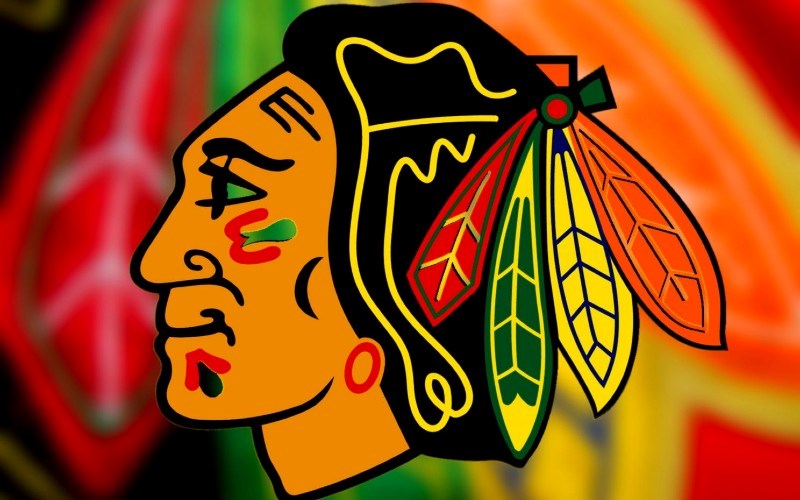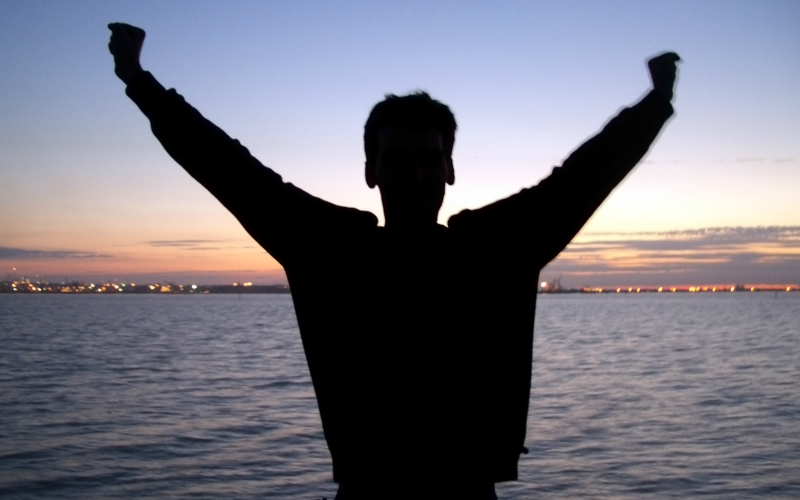The Chicago Blackhawks came up short Sunday, losing 4-2 to the Vancouver Canucks ... and there wasn't be a parade of Pride jerseys. Incredibly, management in a fourth NHL city had called off the special warm-ups, proving to everyone in pro sports that this isn’t just a one-off. This is a movement — and it’s changing everything.
Unlike other teams who’ve bagged the rainbow gear, the Hawks PR department got creative. In Wednesday night’s statement, the front office offered a unique twist to the debate. Instead of citing a potential player boycott or offering no explanation at all, the Hawks insisted the move was made out of concern for the team’s three Russian players — an expert deflection, they hoped, from the criticism other teams faced.
According to the Chicago-Sun Times, team officials consulted with security experts and decided that it was “unsafe” for Nikita Zaitsev, Philip Kurashev, and Anton Khudobin to wear the colors of sexual radicalism after Vladimir Putin signed a new law cracking down on “gay propaganda.” Under the Kremlin’s December policy, promoting, praising, or normalizing LGBT relationships is considered illegal. [Editor's note: Zaitsev was the only one of the three active for the game.]
Certainly, the safety of the league’s Russian players is important (as a Caps fan, I happen to care a lot about the wellbeing of one Alex Ovechkin). But let’s be honest: this was more about the Blackhawks protecting themselves than its international players. While the team insisted the decision was made by the front office — not the players — there had to be more locker-room pushback than insiders are letting on. If not, why scrap the jerseys for every skater? Why not just excuse these three?
And since when has the league cared so much about Russian players? Just last year, a number of high-profile analysts and former players called for the NHL to deport the Russians over the Ukraine war. “The NHL must immediately suspend contracts for all Russian players!” hall-of-fame goalie Dominik Hasek ranted. “… If the NHL does not do so, it has indirect co-responsibility for the dead in Ukraine.”
Athletes like Ovechkin, who had nothing to do with the bombs over Kyiv, lost marketing deals, global ad placement, and spots in international tournaments like Wimbledon and the Paralympic Games. They got death threats. “My clients’ babies on Instagram have been called Nazis,” sports agent Daniel Milstein told reporters. “My clients on the streets in different towns, on the road or at home, have been told to get the [expletive] out of the country and go back to Russia. … People are wishing that they were dead.”
Talk about whiplash. Eight months ago, officials were calling for the Russians to be deported — and now, suddenly, people care about their safety? No one seemed to bother with their welfare — or their families’ welfare — when they demanded that players renounce Putin (which, as history will tell you, doesn’t usually end well).
The point is, this is about a lot more than the league’s 57 Russian players. It’s about a wave of counter-culturalism that’s bigger than the NHL. And if the Blackhawks' decision tells us anything, it’s that this phenomenon is no respecter of states. This isn’t exactly Trump country that’s bucking Pride, after all. It’s New York, New York, Illinois, and Rep. Ilhan Omar’s (D) Minnesota. That’s why it’s so concerning to LGBT activists. They know, like we do, that resistance could strike anywhere. And not just in the NHL.
This summer, all eyes will almost certainly be on Major League Baseball, whose season directly collides with June’s Pride Month. Long before the Philadelphia Flyers’ Ivan Provorov took a stand that upended hockey, five Tampa Bay pitchers already had a mini-Pride rebellion brewing. Now that the country has witnessed the NHL’s courage, how many others will join them? How many conservatives, with years of pent-up frustration, will opt not to pledge allegiance to the Left’s orthodoxy?
In hockey, the sports writers can barely keep up with the rolling protest. Less than 48 hours after the Blackhawks’ announcement, two more shoes dropped in Florida. Thursday night, brothers Marc and Eric Staal — both known for their strong Christian faith — joined the growing list of players who opted not to wear the rainbow colors. Before the Panthers game against the Maple Leafs, they released a joint statement:
“After many thoughts, prayers and discussions we have chosen not to wear a pride jersey tonight. We carry no judgement on how people choose to live their lives, and believe that all people should be welcome in all aspects of the game of hockey.
“Having said that, we feel that by us wearing a pride jersey it goes against our Christian beliefs. We hope you can respect this statement …”
Of course, there will be those — like minor leaguer Luke Prokop — who argue that this trend is “a step backwards.” The Nashville Predators prospect, who’s the first gay-identifying skater to have a contract in the league, complained that players should be forced to wear the jerseys because they “promote respect and inclusion for the LGBTQIA community.”
But, like so many others, he’s conflating “respect” with affirmation. I can respect someone who voted for Bernie Sanders, but I shouldn’t have to put a bumper sticker on my car to prove it. And frankly, respect has been a street that’s run one way for too long. If hockey is for everyone, as the NHL is fond of saying, then it should be for the Provorovs and Staals too.
“Forcing someone to indicate public support for a position they personally disagree with will always be wrong,” Family Research Council’s Joseph Backholm told The Washington Stand. “These teams are attempting to create a litmus test — an oath of loyalty — to cultural dogmas in order to avoid being harassed by the public. It’s really important that people push back, and it’s encouraging to see these hockey players doing that.”
As Sharks goalie James Reimer told the media in his gutsy one-man stand in San Jose, “I can’t speak for everybody else’s heart. There [are] different religions. There’s different beliefs. … There’s guys who are indifferent. … [T]he only thing that I can speak for and that I’m accountable for is my own heart and how the Spirit convicts me. … I truly do love everyone that I come into contact with. And I fail miserably sometimes, but I strive to live a life like Christ. …So people can think whatever they want of me. …But the first commandment is to love God, and when you love Him, there’s certain things that you try to do … like stand up for what I believe.”
And thanks to Provorov, the Staals, and so many players whose names we’ll never know, he’s far from standing alone.
This article appeared originally here.
Notice: This column is printed with permission. Opinion pieces published by AFN.net are the sole responsibility of the article's author(s), or of the person(s) or organization(s) quoted therein, and do not necessarily represent those of the staff or management of, or advertisers who support the American Family News Network, AFN.net, our parent organization or its other affiliates.








